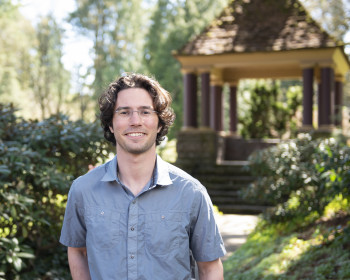Alumni Profile: Alanna Kleinman BA ’13
Open gallery

Alanna Kleinman BA ’13
Major: Religious studies
Hometown: Tucson, Arizona
What drew you to attend Lewis & Clark?
I originally planned to major in environmental studies and was drawn to the program at Lewis & Clark. I also thought I liked rain. In Tucson, it monsoons for one month out of the year. From a young age, that was my favorite month and I dreamt of spending a whole year in the rain. When I visited Lewis & Clark, I was instantly in awe of the campus. The environment was unlike any other I had experienced and I couldn’t wait to spend four years exploring the area.
What do you think makes Lewis & Clark unique?
I think the religious landscape of the Pacific Northwest makes Lewis & Clark a unique place to study religion. Although Portland is situated within the least religiously affiliated region of the United States, a large percentage of residents see themselves as “spiritual.” They just don’t belong to religious institutions.
People in the Pacific Northwest strive for personal autonomy in expressions of spirituality. One of the most exciting things about studying religion at Lewis & Clark is the ability to study outside of the classroom. This opportunity allowed me to encounter and try to make sense of religion outside the confines of textbooks.
How did you become interested in pursuing religious studies?
After high school, I participated in the gap year program, Kivunim: New Directions. I lived and studied in Jerusalem, very close to the old city. I experienced the complexities and issues that arise in a city that is holy to three separate religions.
Once I came to Lewis & Clark and began life in the least religiously affiliated region of the United States, I felt a deep longing to explore religion. I began investigating the Hebrew language as part of an independent study with Paul S. Wright Professor of Christian Studies Rob Kugler and next thing I knew, I was in his Dead Sea Scrolls seminar. There was no turning back.
What was your most memorable Lewis & Clark moment?
One of my favorite memories is from the last semester of my senior year. Associate Professor of Religious Studies Susanna Morrill was set to take over as department chair the following year. She made a few jokes about needing an actual chair for the position, to establish some sort of status.
At the end of a particularly long night at the library, Kayla Aronson BA ’13 and I found ourselves in front of a plastic chair with a few dozen sharpies. We decided to cover the chair in definitions of religion–we had spent the previous year studying the work of a number of theorists–in order to illustrate the variety of definitions that exist simultaneously.
The next day, we snuck the chair into Susanna’s office while she was out. I didn’t realize it at the time, but that chair helped me conceptualize the varieties of religious experience I learned about over the course of my career at Lewis & Clark. These definitions inform my current understanding of religion.
Were there any formative courses or faculty that helped shape the path you’ve taken since graduating?
This year, I made a conscious shift from the academic, historical study of religion to the intensive theological study of Jewish text. The trajectory is vast and scholars devote their entire lives to the study of Torah.
Among other things, my thesis led me down this path. One of the conclusions that I came to is that American Jewish identity should be based more on the positive history of text study and scholarship instead of traumas like the Holocaust. We can only begin to forge a healthy identity when we have pride of accomplishment and peoplehood. After reaching this conclusion, I felt like I needed to practice what I preached. Former executive director of the Oregon Holocaust Resource Center and adjunct professor Sylvia Frankel, who helped me a great deal with research for my thesis, suggested I look into studying at the Pardes Institute of Jewish Studies in Jerusalem.
How did your time at Lewis & Clark help to cultivate your leadership qualities?
Through various volunteer opportunities and internships, I learned how to connect with the wider community at an individual level. As a member of SAAB and as a leadership and service scholar, I gained priceless leadership experience. At a small school, leadership positions and leadership training are wonderfully accessible.
Is there anything else you’d like to say to current or future Lewis & Clark students?
At Lewis & Clark, I heard a lot about the value of a liberal arts education. This year, surrounded by students from a variety of backgrounds, I can confirm the skill set I acquired at Lewis & Clark is immensely useful. I see others working to cultivate similar skills.
I was fortunate to have begun this year with strong reading and writing abilities. And I am greatly indebted to my professors for teaching me how to intelligently approach texts, people, and places with different frames of reference. A liberal arts education is invaluable in the modern world.
More Newsroom Stories
Public Relations is located in McAfee on the Undergraduate Campus.
MSC: 19
email public@lclark.edu
voice 503-768-7970
Public Relations
Lewis & Clark
615 S. Palatine Hill Road MSC 19
Portland OR 97219

